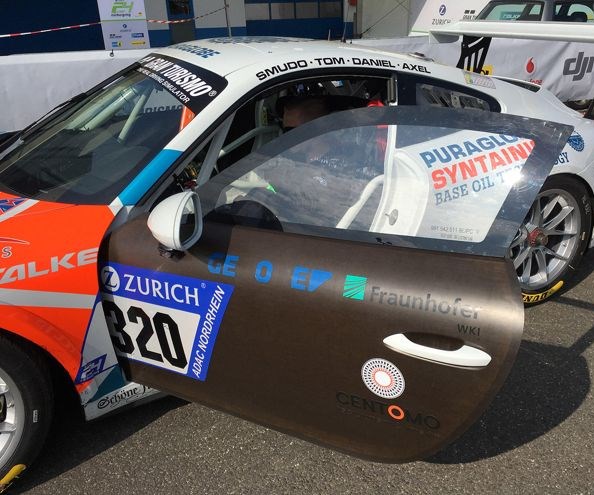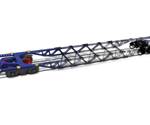Porsche production car produced using natural fiber composites
Porsche’s new 718 Cayman GT4 Clubsport production vehicle features biofiber composite body panels.

The driver and front passenger door as well as the rear wing of the "Bioconcept-Cars" are made of a natural fiber mix. Source | Fraunhofer WKI / Hans-Josef Endres, via lightweight.design magazine
New cars are getting harder with better safety features and more electronics. With the weight also increases the consumption, which is the general goal of CO2 reduction. In e-cars, the weight also plays a major role, because to increase the range of e-cars, the vehicles also need larger and heavier batteries. Real efficiency is therefore associated with e-cars only with new developments in lightweight construction. According to a study by the consulting firm McKinsey, the share of lightweight components in cars must increase from 30-70% by 2030 in order to compensate for the higher vehicle weight through electric drive and engine technology. The solution to this has previously been lightweight steels and carbon fiber-reinforced plastics, but these materials can involve technical challenges involved in processing, repair and recycling, and production of the materials can be energy-intensive.
The Fraunhofer Institute for Wood Research, Wilhelm-Klauditz-Institut WKI (Braunschweig, Germany), therefore, looked for alternative fiber materials and examined available ecological materials for their technical properties, their availability and cost-effectiveness. Their solution is natural fiber-reinforced plastic. Plant fibers as components of biocomposites are, according to the Fraunhofer Institute, a sustainable alternative for lightweight vehicle bodies. The biogenic fraction improves the ecological balance of industrial, high-performance composites during the manufacturing, use and disposal phases. From an economic point of view, the use of renewable raw materials is advantageous because natural fibers from flax, hemp, wood or jute are cheaper than carbon fibers and require less energy to produce.
Together with Porsche Motorsport, scientists from the Fraunhofer WKI first tested biobased materials under extreme conditions for their suitability for series production in a Porsche Cayman GT4 Clubsport. The “Bioconcept Car” has been on the racetrack for the third generation since 2015. The experience was incorporated into materials development for the components of the new 718 Cayman GT4 Clubsport, the first mass-produced car to feature biofiber composite body panels. The driver's and front passenger's door as well as the rear wing are made of a natural fiber mix. The Cayman weighs only 1,320 kilograms, and boasts a weight savings of up to 60% for the doors due compared to steel. The composite consists of a thermosetting, polymeric matrix system reinforced with natural fibers.
This post is courtesy of the CompositesWorld and Springer lightweight.design magazine media partnership. Click here for more information about Springer and lightweight.design.
Related Content
-
CirculinQ: Glass fiber, recycled plastic turn paving into climate solutions
Durable, modular paving system from recycled composite filters, collects, infiltrates stormwater to reduce flooding and recharge local aquifers.
-
Microwave heating for more sustainable carbon fiber
Skeptics say it won’t work — Osaka-based Microwave Chemical Co. says it already has — and continues to advance its simulation-based technology to slash energy use and emissions in manufacturing.
-
Plant tour: Middle River Aerostructure Systems, Baltimore, Md., U.S.
The historic Martin Aircraft factory is advancing digitized automation for more sustainable production of composite aerostructures.















